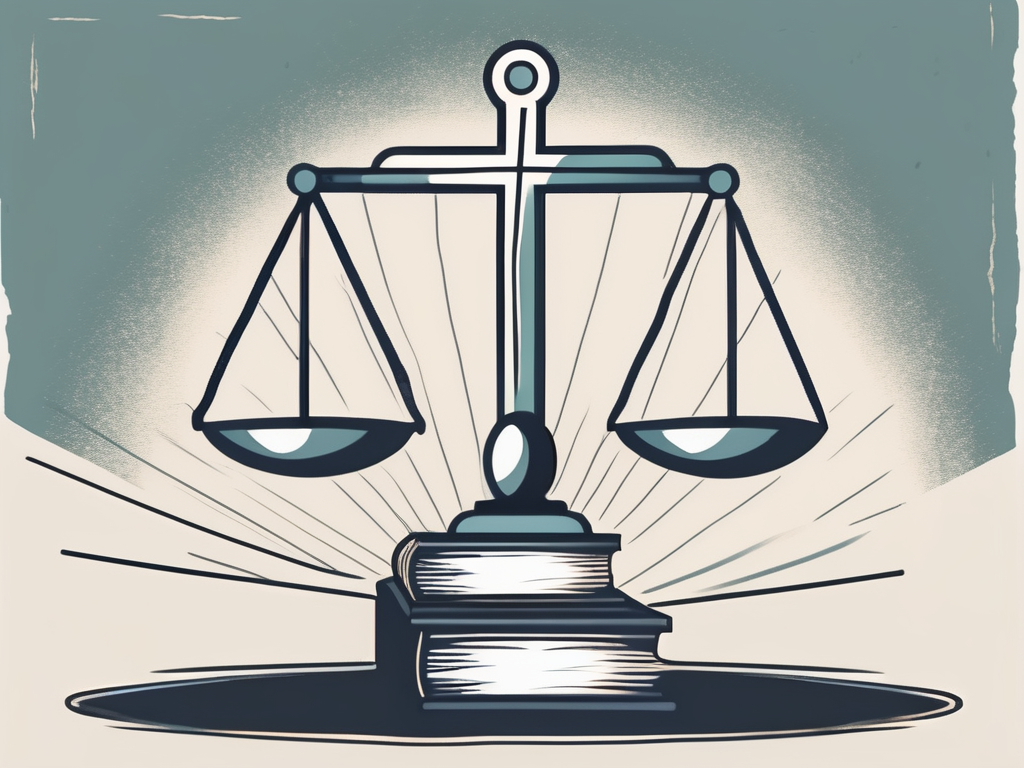Justice is a concept that has been debated and analyzed for centuries. It holds great importance in various cultures and religions, including Christianity. For Christians, the Bible serves as a guide for moral and ethical principles, and it offers valuable insights into the concept of justice. In this article, we will explore what the Bible says about justice, understanding its significance, biblical figures who pursued justice, key verses on justice, the role of justice in the Christian life, and different theological interpretations of justice within Catholic and Protestant theology.
Understanding the Concept of Justice in the Bible
Before delving into the specifics, it is crucial to establish a biblical perspective on justice. In the Bible, justice is closely linked to righteousness and fairness. It is the act of giving each person their due and treating them equitably. Justice in the biblical sense goes beyond legal systems and extends into all aspects of life, including relationships, social structures, and governance.
Defining Justice: A Biblical Perspective
In order to grasp the biblical perspective on justice, we must first define it. From a biblical standpoint, justice involves upholding what is right and ensuring that fairness prevails. It is centered on God’s character and his desire for all people to be treated justly and to pursue justice themselves.
+
Furthermore, the biblical understanding of justice emphasizes the responsibility of individuals to act justly and to champion the cause of the oppressed. It involves promoting equality, defending the rights of the marginalized, and standing against injustice in all its forms.
+
When we examine the biblical narrative, we see justice being woven into the very fabric of God’s interactions with humanity. From the creation of Adam and Eve to the establishment of covenants with Noah, Abraham, and Moses, justice is a recurring theme. It is a reflection of God’s character and his desire for a world where righteousness and fairness prevail.
The Old Testament and Justice
Turning our attention to the Old Testament, we find numerous instances where justice is highlighted as an integral part of God’s character. In the book of Genesis, for example, God’s judgment on the wickedness of Sodom and Gomorrah demonstrates his commitment to justice.
+
This pursuit of justice is further exemplified in the establishment of laws through Moses. The Ten Commandments and the various statutes and ordinances outlined in the books of Exodus, Leviticus, and Deuteronomy reflect God’s desire for a just society. These laws cover various aspects, including social justice, fair treatment of workers, and protection for the vulnerable, such as widows and orphans.
+
The prophets of the Old Testament also play a significant role in advocating for justice. They fearlessly spoke against the oppression of the poor, the abuse of power by corrupt leaders, and the worship of idols. Their voices resonated with calls for justice, mercy, and righteousness.
+
It is important to note that justice in the Old Testament is not solely about retribution or punishment. It is about restoration and reconciliation. The concept of justice is intricately tied to the idea of shalom, which encompasses peace, wholeness, and well-being. Justice, in this sense, is about creating a society where all individuals can flourish and experience the fullness of life.
The New Testament and Justice
As we transition to the New Testament, we encounter the life and teachings of Jesus Christ, whose mission centered on justice and love. Through his earthly ministry, Jesus revealed the heart of God and demonstrated the true meaning of justice.
+
Jesus denounced the hypocrisy of religious leaders who neglected justice in favor of self-righteousness. He emphasized the importance of caring for the marginalized, forgiving others, and seeking reconciliation.
+
Additionally, Jesus’ parables often contained elements of justice, highlighting the responsibility of individuals to treat others fairly. The Parable of the Good Samaritan, for instance, illustrates the concept of loving our neighbors and coming to the aid of those in need.
+
Furthermore, the apostle Paul, in his letters to the early Christian communities, emphasized the importance of justice and equality. He urged believers to live in a manner that reflects God’s justice and to advocate for the rights of all people, regardless of social status or ethnicity.
+
Overall, the New Testament presents justice as an integral part of the Christian faith. It is not merely a concept to be discussed or debated, but a call to action. Believers are called to actively pursue justice, to stand against oppression, and to work towards the establishment of God’s kingdom on earth.
Biblical Figures and Their Pursuit of Justice
The pursuit of justice is a central theme in the Bible, and many biblical figures exemplify this pursuit through their actions and teachings. Two prominent figures who stand out in their commitment to justice are Moses and Jesus Christ.
Moses: A Champion of Justice
One prominent figure in the Bible who exemplified the pursuit of justice is Moses. As the liberator of the Israelites from Egyptian slavery, Moses embodied God’s justice by leading his people out of oppression. His courageous acts of confronting Pharaoh and demanding the release of the Israelites demonstrated his unwavering commitment to justice.
Moreover, Moses played a crucial role in establishing a system of justice by receiving the Law from God on Mount Sinai. The Ten Commandments and the various laws and statutes provided a framework for the Israelites to live in a just and righteous society. Moses consistently sought to ensure that justice prevailed among the Israelites, resolving disputes and acting as a mediator between God and the people.
His commitment to justice serves as an inspiration for Christians today, reminding us of our responsibility to advocate for justice and stand up against injustice. Moses’ story teaches us that justice is not just an abstract concept, but something that requires action and a willingness to confront oppression.
Jesus Christ: The Embodiment of Justice
Of all biblical figures, Jesus Christ stands as the ultimate embodiment of justice. His life, death, and resurrection were driven by God’s desire to restore justice and reconcile humanity to himself. Jesus’ teachings emphasized the importance of treating others with equity and fairness, challenging social norms and speaking against the mistreatment of the vulnerable.
Jesus’ ministry was marked by acts of justice and compassion. He healed the sick, fed the hungry, and welcomed the outcasts. He stood up against the religious leaders who exploited their power and neglected the needs of the people. Jesus’ actions and teachings revealed a deep concern for justice and a desire to bring about God’s kingdom on earth.
Additionally, his crucifixion, an act of profound injustice, ultimately served God’s cosmic plan for justice, redemption, and reconciliation. Through his death and resurrection, Jesus conquered sin and death, offering forgiveness and salvation to all who believe in him. This act of divine justice demonstrated God’s love and mercy, as well as his commitment to setting things right.
As followers of Jesus, we are called to emulate his pursuit of justice. We are called to stand up against injustice, to advocate for the oppressed, and to work towards a more just and equitable society. Jesus’ example reminds us that justice is not just a human endeavor, but a divine mandate that we are called to fulfill.
Key Bible Verses on Justice
Justice in the Psalms
The book of Psalms contains numerous passages that explore justice from a poetic perspective. Psalm 33:5 declares, “The Lord loves righteousness and justice; the earth is full of his unfailing love.” This verse highlights the inseparable connection between justice and God’s love.
Justice, as depicted in the Psalms, is not merely a human endeavor but a divine attribute. It is a reflection of God’s character and his desire for righteousness to prevail in the world. The psalmist’s words remind us that justice is not an abstract concept but a tangible expression of God’s unfailing love for all of creation.
In Psalm 82:3, believers are encouraged to “Defend the weak and the fatherless; uphold the cause of the poor and the oppressed.” Here, the psalmist emphasizes the responsibility of individuals to pursue justice on behalf of the marginalized.
This call to defend the weak and uphold the cause of the poor and oppressed is a recurring theme in the Psalms. It serves as a reminder that justice is not passive but requires active engagement. It requires believers to stand up for those who cannot defend themselves, to advocate for those who are voiceless, and to challenge systems and structures that perpetuate injustice.
Prophetic Books on Justice
In the prophetic books, justice is frequently addressed alongside social and economic inequality. Micah 6:8 succinctly captures God’s expectations of his people, stating, “He has shown you, O mortal, what is good. And what does the Lord require of you? To act justly and to love mercy and to walk humbly with your God.”
This powerful verse from the book of Micah encapsulates the essence of justice. It goes beyond mere legalistic actions and encompasses a way of life. Acting justly involves treating others with fairness and equity, showing compassion and mercy, and humbly walking with God in all aspects of life.
Isaiah 1:17 further emphasizes the connection between justice and righteousness, urging the people to “Learn to do right; seek justice. Defend the oppressed. Take up the cause of the fatherless; plead the case of the widow.”
These words from the prophet Isaiah echo the call to action found throughout the Bible. They remind believers that justice is not a passive pursuit but an active engagement with the world. Seeking justice requires learning to discern what is right, defending the oppressed, caring for the fatherless, and advocating for the widow.
Justice, as portrayed in the prophetic books, is not limited to personal piety or religious rituals. It extends to the social, economic, and political realms of society. It challenges individuals and communities to confront systems of oppression, to dismantle structures that perpetuate inequality, and to work towards a more just and equitable world.
The Role of Justice in Christian Life
Practicing Justice: A Christian Duty
For Christians, justice is not merely an abstract concept but a call to action. It is a duty to actively pursue justice in all areas of life, including personal relationships, professional endeavors, and engagement within society.
+
Practicing justice involves treating others with fairness and dignity, ensuring equal opportunities, and standing up against discrimination. It also means advocating for systemic changes that promote justice, such as reforming policies that perpetuate oppression and inequality.
+
As Christians, we are called to be ambassadors of justice, reflecting God’s character and working towards the establishment of his kingdom here on earth.
Justice and Forgiveness: A Christian Balance
While justice is crucial, it must be balanced with forgiveness in the Christian life. Jesus’ teachings remind us of the importance of extending forgiveness to others, just as we have been forgiven by God.
+
This does not mean that justice should be disregarded or that individuals should be absolved of the consequences of their actions. Rather, it implies approaching justice with a heart of compassion and a desire for restoration. We must strive to learn from Jesus’ example and pursue justice while offering forgiveness and opportunities for redemption.
Theological Interpretations of Justice in the Bible
Justice in Catholic Theology
In Catholic theology, justice is viewed as an essential dimension of human relationships. The Catechism of the Catholic Church emphasizes the importance of social justice, economic justice, and distributive justice.
+
For Catholics, the pursuit of justice involves not only addressing individual needs but also societal structures that perpetuate injustice. The preferential option for the poor, a principle within Catholic social teaching, underscores the responsibility to prioritize the well-being of the marginalized and advocate for their rights.
Justice in Protestant Theology
Within Protestant theology, justice is seen as intimately connected to salvation and God’s grace. The concept of “justification by faith” emphasizes that individuals are made just through their relationship with God and not through their own works.
+
Protestants believe that God’s justice is ultimately revealed through Jesus’ sacrifice on the cross, where he paid the price for humanity’s sins. This understanding of justice highlights God’s redemptive plan and his desire to restore a broken world.
In conclusion, the Bible provides a rich and multifaceted perspective on justice. From the Old Testament to the New Testament, justice is consistently portrayed as an integral part of God’s character and a mandate for his followers. Biblical figures like Moses and Jesus serve as examples of individuals who championed justice and called for its pursuit. Key verses in the Psalms and prophetic books further highlight the importance of justice in the Christian life. Finally, differing theological interpretations within Catholic and Protestant theology shed light on how justice is understood and applied in Christian faith. As believers, we are called to actively practice justice, finding a balance between justice and forgiveness, and advocating for a more just and equitable world.












